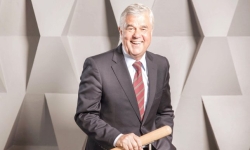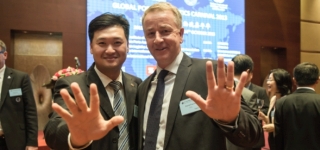NETWORKING THE GLOBAL LOGISTICS COMMUNITY
The Global Institute of Logistics (GIL) was established in 2003 under the Chairman of renowned US logistician and author Robert V. Delaney in response to the global logistics industry’s call for “joined up thinking” amongst stakeholders in the global supply chain.

Since being established in 2003, the Institute has developed a community of over 8,500 logisticians who act a global knowledge network committed to supporting the Institute’s mission of contributing to the resolution of legacy challenges in global logistics.
Challenges associated with the traditional approach of managing single transport modes, modal systems as stand-alone operations. The key to overcoming these legacy challenges is for the individual stakeholder groups within the logistics chain to actively engage with each other. The promotion of this agenda is the Institute’s work.
Acting as a think tank within the sector, GIL brings together thought-leaders as part of a global knowledge network committed to researching and sharing best practices and developing global standards. Today the Institute is a community of organizations and professionals from across the world that share a commitment to collaborating on global logistics solutions.
This work is supported by the Institute’s benchmarking groups which in the first instance convene to share best practice amongst themselves as it relates to the performance of their individual concerns. Secondly, the groups collaborate with each other to build greater mutual understanding which in turn leads to joined up thinking across the supply chain.
The Institute membership base which comprises global shippers, 3PLs, carriers, port authorities and terminal operators collaborate closely, share knowledge and in so doing improve the global supply chain. Members co-operate closely and consistently in leveraging best industry practices to add real value to the supply chain management process.
The vision of the Institute is the establishment of Collaboration as standard policy between stakeholder groups and as the core best practice in logistics execution.
The mission of GIL is to establish a global community who are committed to collaborating on global logistics solutions.
This is achieved by:
Recognizing the individuals and companies who are making a contribution to the industry.
Providing the platform for this community to engage in collaboration.
Documenting best practice developed by the community
Promoting collaboration in logistics.
GLOBAL LOGISTICS IS THE ENGINE THAT POWERS INTERNATIONAL TRADE
Cross-border trade has grown massively in recent decades, with a colossal $18.93 trillion worth of goods imported/exported in 2015. Global Logistics is the engine that powers international trade. 90% of global trade is seaborne, with some 60% shipped in 700 million containers every year and 185 billion tonne-kilometers flown annually.
Globalization has led to faster, cost effective and reliable communications and transport options. Companies are extending their value-creation processes around the world because of lower transport costs. This has led to a growing demand for logistics, and all its elements, transport, storage, transshipment, communications, planning and control services. This demand led growth has increased pressure on Beneficial Cargo Owners to optimize the quality and costs of their logistics services.
Transportation and logistics companies hold a unique position because they are the very entities that make globalisation possible. This industry is made up of companies that supply the systems and software, run the warehouses, provide the consulting and operate the airplanes, boats, trucks and trains that move raw materials, finished goods, packages, documents and people throughout the world. They act as the arteries of commerce.
.
.
.
.
.
.
NETWORKING THE GLOBAL LOGISTICS COMMUNITY
TAUGHT TO COMPETE NOT TO WORK TOGETHER.
Collaboration: “people working together to reach a common goal.”
The transportation and logistics landscape is highly fragmented, due largely to the numerous moving parts it takes to get a Beneficial Cargo Owners (BCO) product from concept design through production and all the way to the end-user’s hands.The quality and costs of logistics services are directly influenced by the level of collaboration between the parties responsible for the execution of the task. Collaboration results in more effective co-ordination and control in the flow of goods between the point of origin and the point of consumption. Collaboration increases communication resulting in the harmonization of the freight, finance and data flows that constitute the logistics process. The net effect is increased reliability, lowers costs and improved inventory management. The Institute promotes collaboration between stakeholders in the logistics industry. By Collaboration we mean the creation, development and maintenance of relationships between global logistics partners resulting in mutual exchange and fulfilment of promises at a profit. It is a philosophy for doing business successfully; it promotes a culture that puts the buyer-seller relationship at the centre of a firm’s strategic and operational thinking.
Logistics systems are the arteries of trade and central to the success of globalization in the 21st century. Beneficial Cargo Owners are basing decisions on how they organise production and in fact their whole corporate structures entirely on the provision of logistics services. The ‘modular production’ model is an example. In this, contract Beneficial Cargo Owners carry out production against a background of organisational change. The set-up comprises small and large firms, and small and large geographical scales; it aims to create a large number of products in few processes to receive maximum revenue through economies of scale. Logistics has grown to become the key unit within this set-up, since it has to provide agility and flexibility for any one module, as well as for the interaction of all modules, in the entire network. That means organisational as well as geographical flexibility. Thus a major shift has occurred in how and where commodities and their components are being assembled, manufactured and distributed.
This combined with the continued push toward efficient manufacturing processes such as lean and Six Sigma mean that it’s not enough for Beneficial Cargo Owners to know that critical parts or stocks are on the way or have been shipped. They need to know exactly where supplies are in the supply chain, whether they’ve cleared customs, whether they’re sitting in a warehouse or if they’re on the last leg in a journey to the loading-dock or the customer.
For the global logistics system to work in support of these new models there has to be increased collaboration between logistics service providers across continents. This is the work of the Institute to encourage and develops collaboration between these providers, resulting in higher logistics service quality and consequently a better economic performance of all partners.
By Collaboration we mean the creation, development and maintenance of relationships between global supply chain partners resulting in mutual exchange and fulfilment of promises at a profit. It is a philosophy for doing business successfully; it promotes a culture that puts the buyer-seller relationship at the centre of a firm’s strategic and operational thinking.
The Institute has a particular focus on maritime container logistics which is perceived as highly fragmented. We work closely with port authorities, container terminal operators,shipping lines, freight forwarders and 3PL’s and encourage them to re-think their role in the logistics process. Our aim is to break down the silo based approach to process execution in the logistics supply chain.
.
.
NETWORKING THE GLOBAL LOGISTICS COMMUNITY
SHENZHEN OCTOBER 2013
INSTITUTE CELEBRATES ITS 10TH ANNIVERSARY IN SHENZHEN
In 2003 a group of logistics executives from across the world came together to form the Global Institute of Logistics. 10 Years on GIL is playing its part in making the world smaller through its philosophy of promoting collaboration.
Shenzhen China played host to the 10th anniversary celebrations of the Global Institute of Logistics this October. It was to Shenzhen that Institute researchers first turned their attention to at the time of GIL’s inception in 2003.
The Institute’s first research program focussed on how United States Beneficial Cargo Owners (BCO’s) sourcing in Southern China engineered “best in class” logistics solutions. The research focussed on the consumer products companies using the Trans Pacific Trade Lane, shipping more than 10,000 TEU annually.
China’s entry into the World Trade Organization in November 2001 was the beginning of the present era of globalization. The figures for internationally traded goods between then and now show just how enormous an impact on world trade it had with an increase of over $1 Trillion over the period. This translates directly to a significant increase in container flow, China witnessed a 100% increase in container throughput from 2001-2003.
“Together we have been able to make a contribution to “thought leadership” and I am proud to say that many of the theories we expounded over the years are slowly playing out in reality.”
KIERAN RING FOUNDER & CEO GIL
Reflecting on its mission statement first outlined in 2003 that:
“The Global Institute of Logistics will develop a community of like minded professionals from across the world committed to building strong relationships in pursuit of a logistics system fit for purpose. Logistics systems are the arteries of trade and central to the success of globalization in the 21st century. These systems will rely heavily on collaboration between stakeholders across continents,the Institute’s work will be to identify the corporations and people central to its success”
Kieran Ring Founder and CEO of GIL said, “It has taken enormous commitment and dedication by all supporters of the Institute to get to our 10th anniversary, but it has been worth it, slowly but definitely we have established a community of like minded professionals who love this industry and the science behind it. Together we have been able to make a contribution to “thought leadership” and I am proud to say that many of the theories we expounded over the years are slowly playing out in reality.
CLICK HERE TO READ FULL STORY
.
.
.
.
.
.
NETWORKING THE GLOBAL LOGISTICS COMMUNITY
 MR. JOST HELLMANN
MR. JOST HELLMANN
PRESIDENT
HELLMANN WORLDWIDE LOGISTICS
“I commend the Global Institute of Logistics for its work in promoting collaboration as the key to delivering global logistics solutions. We have moved from an Industrial Age enterprise to a 21st century business. This period of transition from one economic order to another sees the ending of an era when businesses were inwardly focused concentrating on a buyer seller model to a truly outwardly focused model concentrating on collaboration as the key means to add value and impact the bottom line. Collaboration is destined to be a primary proficiency for the next millennium and I welcome the Institute’s work in establishing this new order.”
 MR. HEINRICH GOLLER
MR. HEINRICH GOLLER
MANAGING DIRECTOR
HAMBURGER HAFEN & LOGISTIK
“Certification according to the Global Institute of Logistics CTQI standard shows that Container Terminal Altenwerder (CTA) procedures, management organisation, and performance all meet the requirements. At the same time, the certification stimulates our team to further improve the performance for and with our customers. Thanks to the exchange of knowledge and experience with other international terminal operators during the Institutes benchmarking process, new impulses for our own development also arose. The additional operating effort is manageable since reliable and fast operating and information processes are of great importance to CTA anyway.”
 MR. JERRY BRIDGES
MR. JERRY BRIDGES
PRESIDENT VIRGINIA PORT AUTHORITY
“I am excited about being part of an organization that is solely focused on improving our industry using education, knowledge, data analysis, benchmarking and standards as the primary tools, the Institute’s approach is to look at every aspect of the issue to bring about the right kind of change that will benefit all of the components in the logistics chain and ultimately result in more business”
 MR. MARCUS LEAVER
MR. MARCUS LEAVER
OCEAN FREIGHT DIRECTOR
DB SCHENKER
“It is not without reason that the Institute enjoys a fine reputation in the eyes of the world. It stands for inventive talent, hard work, and the ability to organise. These are but a few of the attributes needed, to master the challenges of introducing a Global Container Terminal Quality System. It was a great pleasure to work as a member of this team ”
 MS. RUTH SOL
MS. RUTH SOL
PRESIDENT WESTAC CANADA
 MR. GENE TYNDALL
MR. GENE TYNDALL
VP TOMPKINS INTERNATIONAL
 DR. FU YUNING
DR. FU YUNING
CHAIRMAN CHINA RESOURCE HOLDINGS
 MR. JOACHIM COENS
MR. JOACHIM COENS
PRESIDENT ZEEBRUGGE PORT AUTHORITY
 SENATOR FRANK HORCH
SENATOR FRANK HORCH
MINISTRY OF ECONOMY HAMBURG
 MR. JOACHIM COENS
MR. JOACHIM COENS
PRESIDENT ZEEBRUGGE PORT AUTHORITY
.
.
.
.
. .
.

INDIA JANUARY 6TH 2018:
"Understanding Chinese politics will be as important as understanding the
workings of its economy — the two are, of course, connected — and will be a
necessity as Indian leaders, entrepreneurs and ordinary citizens begin to engage
with China. This is an engagement that will be both inevitable and crucial for
India to figure out what it must and must not do to pull itself out of a culture
of second-best or no-good-at-all, of finding space for its own constitutional ideals
and values in a world increasingly hostile to complex ideas and prone to being
swayed by Chinese lucre"
JABIN T. JACOBS INSTITUTE OF CHINESE STUDIES DELHI
Click For More (external site)

GIL NETWORKING THE GLOBAL LOGISTICS COMMUNITY


